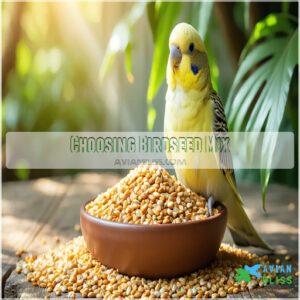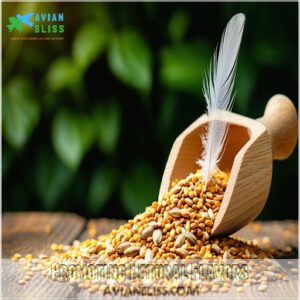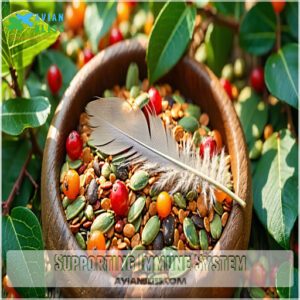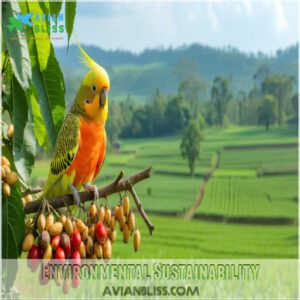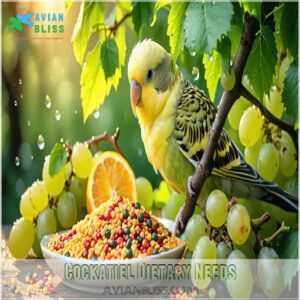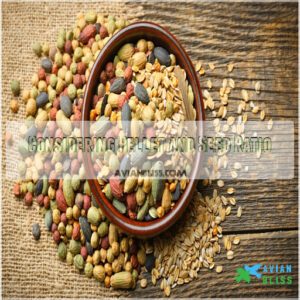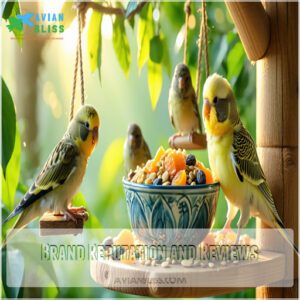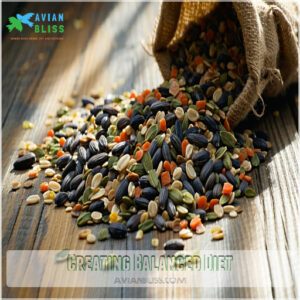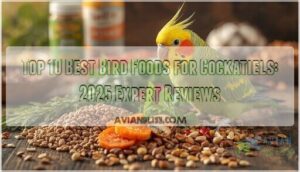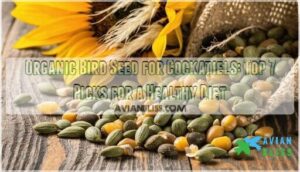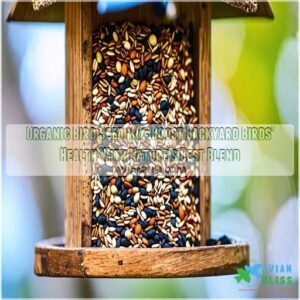This site is supported by our readers. We may earn a commission, at no cost to you, if you purchase through links.
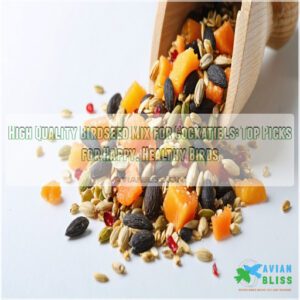
Look for mixes with premium whole seeds like millet, canary seed, and safflower. A balanced mix should include protein sources for strong feathers, healthy fats like flaxseed for vibrant plumage, and added vitamins.
Organic options are great because they’re free of pesticides and harmful chemicals. Store the seeds in airtight containers in a cool, dry spot to keep them fresh.
Avoid basic seed-only diets—cockatiels thrive on variety with pellets, fruits, and veggies too. A colorful, diverse mix keeps mealtime interesting and your bird thriving!
Table Of Contents
- Key Takeaways
- Choosing Birdseed Mix
- Organic Bird Seed Benefits
- Cockatiel Dietary Needs
- Evaluating Seed Mixes
- Creating Balanced Diet
- Frequently Asked Questions (FAQs)
- How to make seed mix for cockatiels?
- What is the best bird seed mix?
- What is the best cockatiel bird food?
- Are seeds or pellets better for cockatiels?
- How can I encourage a picky cockatiel to eat?
- Are sprouted seeds better than dry seeds?
- What are the benefits of foraging activities?
- How do I prevent seed mix spoilage?
- What are signs of an unbalanced diet?
- Conclusion
Key Takeaways
- Look for seed mixes with premium whole seeds like millet, canary seed, and safflower, and avoid fillers or excessive sunflower seeds.
- Include variety like pellets in your cockatiel’s diet to balance nutrition and keep meals interesting, with additions like fruits, and veggies.
- Opt for organic birdseed to avoid harmful pesticides and chemicals, and store seeds in airtight containers in a cool, dry spot to keep them fresh.
- Watch for signs of an unbalanced diet, like dull feathers or weight changes, and adjust their food portions and variety as needed.
Choosing Birdseed Mix
Picking the right birdseed mix guarantees your cockatiel gets the balanced nutrition it needs to stay healthy.
Look for high-quality ingredients, like millet and safflower seeds, and avoid mixes with fillers or excessive sunflower seeds, to ensure you provide the best for your pet.
Quality Ingredients Matter
High quality birdseed starts with quality ingredients.
Look for fresh, premium options to support cockatiel nutrition. Choosing an organic bird seed mix avoids harmful chemicals and supports bird health.
A nutritious cockatiel food mix should avoid unnecessary fillers and include:
- Whole seeds for nutrient balance.
- Healthy oils, like flaxseed, for feather health.
- Natural additives enriched with vitamins.
- Fresh ingredients to guarantee excellent taste and nutrition.
Your bird deserves the best!
Nutritional Content Importance
Why does nutritional content matter in your cockatiel’s food?
Balanced nutrients support their energy, healthy feathers, and overall well-being.
A healthy cockatiel diet plan consists of pellets, seeds, fruits, and treats.
Combine seeds, pellets, and fresh produce for balanced cockatiel nutrition.
Premium cockatiel food should include healthy fats, protein sources, and essential vitamins.
Aim for variety and proper ratios for a happy, thriving bird.
| Nutritional Elements | Benefits |
|---|---|
| Protein Sources | Strong feathers |
| Healthy Fats | Skin health |
| Vitamins | Boost immunity |
| Carbohydrates | Extra energy |
| Nutrient Balance | Essential for health |
Freshness and Storage
Freshness matters when choosing a high-quality birdseed mix.
Proper storage keeps quality ingredients intact. Use these tips:
- Airtight Containers: Seal the mix to prevent moisture and pests.
- Cool, Dry Locations: Avoid humidity for longer shelf life.
- Check Expiry Dates: Always confirm a freshness guarantee.
- Small Quantities: Buy manageable amounts to maintain peak freshness.
Good storage equals happy birds!
Diversity of Ingredients
A great seed mix for cockatiels should be as colorful as their personality.
Diversity of ingredients supports dietary enrichment and keeps meals exciting.
Consider a diverse cockatiel blend for balanced nutrition.
Look for a premium birdseed cockatiel blend with a balance of whole seeds, grains, and herbs.
Include food rotation for nutrient balance.
Here’s an example:
| Ingredient | Nutrient Purpose | Examples |
|---|---|---|
| Proteins | For feather growth | Legumes, nuts |
| Healthy Fats | Skin and feather health | Flaxseeds, safflower |
| Carbohydrates | Energy source | Millet, canary seeds |
Organic Bird Seed Benefits
Choosing organic bird seed for your cockatiel helps avoid harmful pesticides and GMOs, giving your bird safer, cleaner food.
It also supports natural flavors and nutrients, promoting better health and a stronger immune system.
Avoiding Pesticides and GMOs
Choosing organic bird seed means avoiding pesticide risks and harmful GMOs.
Look for USDA Organic Certification to guarantee a GMO-free seed mix that’s safe for your cockatiel.
Non-toxic foods from sustainable sources support their health.
Organic options guarantee pesticide-free, nutrient-rich ingredients, helping your feathered friend thrive.
An organic seed mix is a simple step toward a safer, healthier diet, providing a safer alternative for your pet.
Promoting Natural Flavors
A high-quality birdseed mix with natural ingredients enhances your cockatiel’s dining experience.
Organic bird seed keeps flavors fresh, mimicking their natural diet.
Choosing an organic bird seed mix avoids harmful chemicals and promotes bird health.
A diverse cockatiel seed blend, like millet and safflower, adds variety while reducing artificial additives.
Fresh harvest and organic options guarantee natural flavor enhancement, encouraging better nutrition.
Choose a healthy cockatiel mix to keep your bird happy and engaged, with a focus on natural ingredients.
Supporting Immune System
A healthy immune system keeps your cockatiel strong and resilient.
Organic bird seed and nutritious pellets can be immune boosters when enriched with vitamins and antioxidants. Probiotics in high quality birdseed mixes also promote a healthy gut.
Look for:
- Organic seed with no pesticides
- Vitamin supplements included
- Antioxidant-rich ingredients
- Probiotic-enhanced cockatiel nutrition seed
Maintain a varied, balanced diet!
Environmental Sustainability
Organic bird seed supports eco-friendly and green living practices.
Sustainable seeds from USDA Organic Certified farms are grown pesticide-free and GMO-free, promoting eco conservation.
Ethical sourcing makes sure the environment stays healthy, too.
By choosing these seeds, you’re supporting organic farming while giving your cockatiel safe, natural food.
It’s a small yet impactful way to care for birds—and the planet!
Cockatiel Dietary Needs
Your cockatiel’s diet needs a careful balance of proteins, fats, carbohydrates, vitamins, and minerals to support their health and energy.
Providing fresh water daily and offering a mix of seeds, pellets, vegetables, and fruits helps guarantee they get the nutrients they need, supporting their overall health.
Protein Sources and Importance
Protein supports feathers, muscles, and energy. High-quality bird food boosts nutrient value.
Great protein sources include:
- Hard-boiled eggs – Easy, nutrient-packed treat.
- Cooked legumes – Chickpeas or lentils offer amino acids.
- Millet – A protein-rich seed option.
- Pellets – Prevent picky eating.
- Protein-rich treats – Lean meats supplement Protein Requirements effectively.
A balanced diet with best bird food options is essential for cockatiel health.
Strong feathers reflect solid cockatiel nutrition tips!
Fat and Carbohydrate Requirements
Cockatiels need a mix of fats and carbohydrates for energy.
Include seeds like millet for carbs and safflower for balanced fat levels. Avoid too many sunflower seeds—they’re tasty but pack extra fat.
Here’s a quick comparison for your cockatiel birdseed mix:
| Seed | Fat Content | Carb Content | Protein | Recommended Use |
|---|---|---|---|---|
| Sunflower Seeds | High | Moderate | Low | Treats, sparingly |
| Millet | Low | High | Low | Daily, carb source |
| Safflower Seeds | Moderate | Moderate | Moderate | Regular, staple seeds |
| Canary Seeds | Low | Moderate | Low | Supplement variety |
| Flaxseeds | High | Low | Moderate | Omega-3, occasional |
Adjust portions based on energy requirements to maintain a healthy nutrient balance. Fresh water is important too!
Vitamin and Mineral Supplements
Vitamins and minerals play a key role in your cockatiel’s health, filling gaps in their nutritional content.
A balanced diet often meets most needs, but supplements can help during growth or egg-laying.
Always prioritize supplement safety and avoid overuse.
- Prevent mineral deficiencies with calcium supplements during nesting.
- Ensure nutrient balance with high-quality ingredients.
- Boost dietary enrichment using vitamin drops sparingly.
Hydration and Fresh Water
Fresh water isn’t just for drinking—it’s a cornerstone of bird care.
Cockatiels need clean, fresh sources daily for proper hydration. Use filtered water for better water quality, and wash bowls to prevent bacteria.
Hydration tips? Monitor your bird’s water intake.
Bonus: bird bathing in shallow dishes keeps feathers pristine and your cockatiel happy.
Healthy birds, happy life!
Evaluating Seed Mixes
When evaluating seed mixes for your cockatiel, focus on the right balance of seeds, pellets, and other nutrients to meet their dietary needs.
Stick to trusted brands with positive reviews, and check for fresh, high-quality ingredients free from fillers or harmful additives, ensuring the mix meets your cockatiel’s needs with the right balance of seeds.
Considering Pellet and Seed Ratio
Balancing the pelletseed ratio is key for a healthy cockatiel diet. Experts suggest 40% pellets and 30% high-quality seeds for diet optimization.
Consider exploring a cockatiel pellet seed mix for convenient options.
Follow these feeding guidelines for nutrient balance and proper diet management:
- Mix pellets with premium birdseed mix cockatiel options.
- Avoid diets heavily based on seeds alone.
- Always prioritize nutrient balance.
- Adjust portions as needed for activity levels.
Brand Reputation and Reviews
When choosing the best cockatiel birdseed, rely on customer reviews and reputation analysis.
Top cockatiel birdseed brands like Volkman and Harrison’s excel in quality, while Kaytee raises concerns about past issues.
For birdseed for cockatiels, user feedback highlights freshness and minimal fillers.
Research brand ratings before buying cockatiel seed online or locally—product comparison guarantees premium cockatiel food online for your feathered friend.
Understanding the importance of top rated mixes can also help in making informed decisions about cockatiel birdseed.
Creating Balanced Diet
To keep your cockatiel healthy and thriving, it’s important to provide a well-balanced diet with the right mix of seeds, pellets, vegetables, and fruits.
By offering variety and carefully controlling portions, you’ll make sure your bird gets all the nutrients it needs to stay healthy.
Portion Control and Feeding Guidelines
A balanced diet starts with portion control. Stick to a daily ration of 1-2 tablespoons of birdseed for cockatiels and pellets combined.
Avoid overfeeding to reduce health risks like obesity.
Follow this simple feeding schedule:
- Serve fresh food daily.
- Measure meal size carefully.
- Make sure constant access to clean water.
- Mix seeds with pellet options.
- Adjust quantities for activity levels.
This schedule is designed to provide a balanced diet while ensuring the bird’s health and well-being.
Introducing New Foods and Variety
After portion control, focus on introducing Dietary Enrichment through Food Rotation and Seed Variety.
Gradually mix new top cockatiel birdseed into their usual meal. This encourages exploration and boosts Nutrient Balance.
Opt for seed mixes with high nutritional content, combining fresh veggies or fruits alongside bird food for cockatiels.
Proper Meal Planning keeps their cockatiel diet seed-rich but balanced and engaging.
Monitoring Health and Adjusting Diet
How can you tell if your cockatiel’s diet needs adjustments? Regular health checks are key.
Watch for signs like dull feathers, changes in droppings, or a flaky beak.
Follow these tips to maintain nutrition balance:
- Monitor feather condition regularly.
- Check beak health for cracks or flakiness.
- Weigh your bird weekly.
- Observe behavior changes.
- Adjust the cockatiel diet as needed.
A well-planned diet requires understanding balanced nutrition requirements to keep your bird healthy.
Avoiding Toxic Foods and Substances
Always steer clear of toxic foods like avocados, chocolate, caffeine, onions, and garlic.
They cause serious cockatiel food dangers, such as chocolate poisoning and onion hazards. Even tiny amounts can trigger avian health issues.
You can find safe non-toxic bird food from reputable sources.
Stick to a pesticide-free, GMOfree diet to avoid dangerous substances.
Knowing this toxic food list helps you protect your bird’s health and happiness effectively. Fresh food matters!
Frequently Asked Questions (FAQs)
How to make seed mix for cockatiels?
To make a healthy cockatiel seed mix, combine millet, safflower seeds, flaxseeds, and hulled oats.
Add dried vegetables, like carrots, and a few dried fruits.
Provide a variety, avoiding harmful foods like chocolate or avocado.
What is the best bird seed mix?
The best bird seed mix for cockatiels offers variety and nutrition, like Volkman Avian Science Super Cockatiel Food.
It’s sunflower-free, packed with clean seeds, papaya, and carrots, ensuring balanced nutrients for a healthy cockatiel.
What is the best cockatiel bird food?
For cockatiels, balanced nutrition matters most.
Volkman Avian Science Super Cockatiel Food is excellent, avoiding sunflower seeds while mixing veggies, seeds, and fruits.
Pair it with 40% pellets, veggies, and fruits for a complete diet.
Are seeds or pellets better for cockatiels?
Pellets are better for cockatiels’ balanced nutrition since they contain essential vitamins and minerals.
Seeds add variety but shouldn’t be the main part of their diet because they’re high in fat.
Combining both maintains health, energy, and long-term happiness.
How can I encourage a picky cockatiel to eat?
Try mixing new foods with their favorites, like sprinkling pellets over seeds.
Offer variety, including small vegetables or fruits.
Be patient, removing uneaten food daily, and avoid overwhelming them with too much change at once, to ensure a smooth transition with variety.
Are sprouted seeds better than dry seeds?
Funny enough, sprouted seeds pack more punch than dry ones by boosting nutrients like vitamins and enzymes.
They’re easier to digest, too, helping your bird’s absorption.
Just make sure to do proper cleaning to avoid harmful bacteria.
What are the benefits of foraging activities?
Foraging activities keep your cockatiel’s brain sharp, encouraging natural instincts while providing exercise and stress relief.
Searching for food mimics wild behavior, prevents boredom, and helps assure a balanced diet through enriched feeding experiences.
How do I prevent seed mix spoilage?
You might think seed mix stays fresh forever, but it doesn’t.
Store it in an airtight container, keep it cool and dry, and check for bugs or mold regularly.
Avoid direct sunlight to prevent spoilage.
What are signs of an unbalanced diet?
Signs of an unbalanced diet include dull feathers, excessive molting, weight gain or loss, lethargy, watery droppings, or excessive seed eating.
Watch for poor appetite or beak overgrowth, and adjust their diet for proper nutrition.
Conclusion
A well-rounded diet is the bread and butter of a happy cockatiel.
A high quality birdseed mix for cockatiels, rich in millet, safflower, and flaxseed, provides essential nutrients for strong feathers and vibrant health.
Combine this with fresh fruits, veggies, and pellets to keep meals nutritious and exciting.
Always check for organic options to avoid harmful chemicals and store seeds properly for freshness.
Offer clean water daily and adjust portions as needed to match your bird’s needs, ensuring a happy cockatiel with vibrant health.
- https://birdtricksstore.com/blogs/birdtricks-blog/homemade-cockatiel-seed-and-grain-mix-recipe
- https://www.amazon.com/bird-seed-cockatiels/s?k=bird+seed+for+cockatiels
- https://www.talkcockatiels.com/threads/best-brand-of-seed-mix.60857/
- https://parrotdipankarstores.com/product/cockatiels-lovebirds-choice-mix-seed-4-750kg/
- https://www.seedzbox.co.uk/products/seedzbox-ultimate-deluxe-cockatiel-food-seed-feed-mix-1kg

